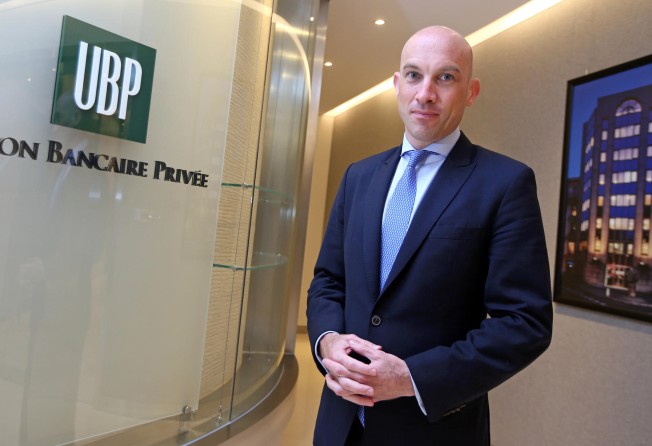Generational transition, technology and more open clients offer fresh niches for advisers in Asia, says UBP's Michael Blake

Only operating in its present guise since early April, Union Bancaire Privée (UBP) may be the new kid on the block in Hong Kong's banking sector, but it can draw on an illustrious heritage as it looks to pursue ambitious plans for expansion.
Formed as a result of the acquisition of Coutts International from RBS by family-owned UBP, which has headquarters in Geneva, the new entity has its sights set on meeting the investment needs of Asia's ever-growing millionaire class.
"Wealth is still being accumulated faster in this part of the world than anywhere else, and 50 per cent of that wealth [is] not being professionally managed," says Michael Blake, UBP's Singapore-based chief executive for private banking in Asia. "We are also on the brink of a transition between generations, so the main challenge for us is how to take advantage of those opportunities." Originally founded in 1969, the bank sees itself as an asset management specialist able to adapt to new market environments.
It recognises too that the industry is at something of an inflection point, with banks realising they can't be all things to all people and forced to reassess their overall proposition and relative strengths.
"In today's market, you have to be very clear [about] what you do and don't offer," says Blake, formerly chief executive of Coutts International. "Private ownership enables us to make quick decisions, remain flexible, and give clients the benefit of our experience in the selection of alternative assets."
So far, the regional team includes close to 70 private bankers, split quite evenly between offices in Hong Kong and Singapore. Assets under management in Asia already amount to roughly 14 billion (HK$113 billion) Swiss francs, which compares with the organisation's global number of around 110 billion Swiss francs. And, thanks to minimal disruption during the transfer of ownership, the average length of relationship with clients inherited from Coutts is something like 10 years.
A fair proportion of these clients are first- or second-generation entrepreneurs who still have a bias towards Asia in asset allocation.
"There is no reason why that should change," Blake says. "Clients tend to have a propensity to invest close to home in markets they understand. But one trend we see is a convergence between the European and Asian styles of investing. For example, Asian clients now see less need to be so hands-on in the decision-making. They are more willing to accept the discretionary and advisory solutions which the bank can offer."
Indeed, around 10 per cent of UBP's book in Asia is handled on a discretionary basis and about 20 per cent as advisory business.
Even so, in working with clients who are self-made entrepreneurs, used to calling the shots and controlling their own financial decisions, relationship managers have to show intelligence and intuition.
"The majority of the people we deal with are extremely sophisticated and very discerning," Blake says. "But there is also a generational change taking place. The younger generation are more open to discussions about a discretionary or advisory proposition as one aspect of planning for a transfer of wealth."
In the near term, foreseeable challenges for the bank include dealing with the impact of the common reporting standard, which will only become clear when the mechanism is fully agreed.
There will also be further adoption and integration of technology. Inevitably, online access and mobile links are already changing the private banking sector, but Blake certainly doesn't see IT replacing human beings at the core of the wealth management relationship.
"There is a lot of focus now on the potential for disruption with new technology, and a lot of people are rushing to meet that requirement," he says. "But clients are not clear yet how they want to use technology to engage with private banks. They will call up to have that sensitive conversation about succession planning or to review a portfolio, and that is not something a computer can replace."
With that in mind, UBP also has plans to hire more relationship managers able to provide a full range of products and services for the increasing number of mainland-based clients with an international footprint. The intention is to handle such business in Hong Kong or Singapore. "The decision to go onshore in China may be appropriate for other types of financial services business, but it is not something we see as a priority at the moment," Blake says.
Regarding general economic prospects, he sees no great cause for concern about China's slowing rate of GDP growth. If the mainland achieves its forecast of 6 per cent plus, this year, that will still put most Western economies, with forecasts of up to 2 per cent growth, in the shade.
"It is all relative, but China will continue to become an increasingly important part of the global economy," Blake says. "Just consider that last year there was more than US$100 billion outbound M&A [mergers and acquisitions] activity from China.
"You will see these very real trends having a day-to-day impact on financial services over the next decade or two," he adds. "In other respects, our house view is that conditions in developing economies will stabilise in the second half of the year and monetary policy will continue to be accommodative."